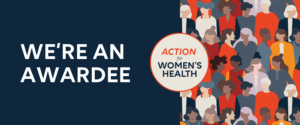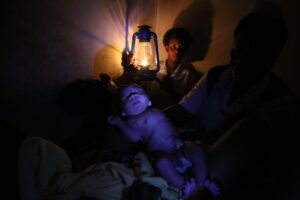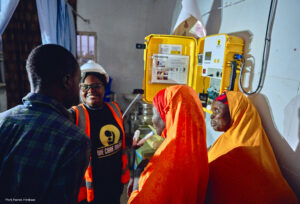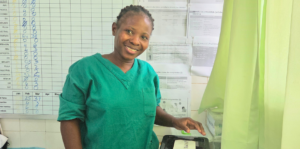An Interview with Dr. Charles Olaro by Amy Donhauser, We Care Solar
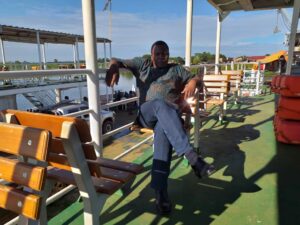 As Director of Clinical Health Services at the Ugandan Ministry of Health, Dr. Charles Olaro is devoted to improving the health care infrastructure, clinical services, and public health for the citizens of Uganda. In addition to having advanced degrees in Medicine, Health Services Management, and Business Administration, Dr. Olaro has 23 years of experience as a surgeon. His personal experience working in hospitals without grid electricity, or with sporadic electricity due to load shedding, made him an early champion of Light Every Birth. And as the father of four girls, he has a special affinity for reproductive health care. Through his leadership at the Ministry of Health, he has been instrumental in building a strong partnership between We Care Solar and the Ministry of Health in Uganda, helping us to launch our national initiative in 2018. He spoke with Amy Donhauser, Senior Program Manager at We Care Solar, about The Power of Partnership.
As Director of Clinical Health Services at the Ugandan Ministry of Health, Dr. Charles Olaro is devoted to improving the health care infrastructure, clinical services, and public health for the citizens of Uganda. In addition to having advanced degrees in Medicine, Health Services Management, and Business Administration, Dr. Olaro has 23 years of experience as a surgeon. His personal experience working in hospitals without grid electricity, or with sporadic electricity due to load shedding, made him an early champion of Light Every Birth. And as the father of four girls, he has a special affinity for reproductive health care. Through his leadership at the Ministry of Health, he has been instrumental in building a strong partnership between We Care Solar and the Ministry of Health in Uganda, helping us to launch our national initiative in 2018. He spoke with Amy Donhauser, Senior Program Manager at We Care Solar, about The Power of Partnership.
What is the role of the Ministry of Health in Light Every Birth? Why does the Ministry of Health work with partners?
The Ministry of Health works with partners to develop strong public-private partnerships for health, including its partnership with We Care Solar. All of you are aware that in most developing countries, one of the areas in which we are not doing very well in terms of health indicators is maternal-child health. So lighting every birth is key because it’s one of those motivators that will get patients to come to health facilities. The main electricity grid is not available in all parts of the country; it’s mainly in the urban areas. So this program is especially handy in the rural areas. And the availability of lighting provided by We Care Solar Suitcases has been able to increase the utilization of maternal health services in the country. It definitely has been able to avert some of the poor outcomes in maternal and newborn health. It has also had other aspects—such as providing a motivator for health workers—because working in a well-lit environment provides more motivation than working in dark are. Also, you are able to apply infection prevention much more better in a well-lit area.
This initiative has been embraced by the highest levels of the country because the First Lady of Uganda is one of the key champions, the Speaker of the House of Parliament, and the honorable Minister of Health, all of them are supportive of this initiative to see that we “Light Every Birth” in Uganda.
Why do you seek partnerships? What value do you see in working together with partners?
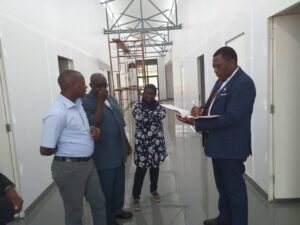
Partnerships allow you to build synergies; you are able to harness the different strengths of each partner. We Care Solar has been able to mobilize a number of partners. If you look at Sustainable Development Goals and even previously the Millennium Development Goals, partnership for health is one of those key areas that helps countries to advance. Sometimes [the partnerships] are in terms of technology support, sometimes it could be in terms of financing…so all those areas, you can be able to harness them from different partners. We highlighted part of the health care electrification with other partners, we are also worked with World Bank where we have been able to light most of our rural health facilities. If we had not had our partnership, we would not have been able to achieve this. So partnership is one of those tools which really, as countries, you can use to harness to achieve your goals as a country in providing safe and quality healthcare services to mothers of this country.
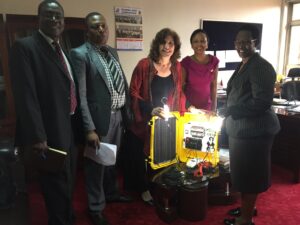
What is the greatest impact in your work as a result of partnership with We Care Solar and/or others?
First of all, there has definitely been an increase in the number of deliveries in the health facilities. Secondly, it has definitely motivated our health workers. They are able to communicate because they are able to charge their phones at the same time as they are at work. This assists in the referrals. This has definitely been a key achievement. You all know that we really want to push for all the mothers to delivery in the health facility so if there are complications they are managed much earlier rather than if mothers stayed and delivered at home.
Given your long relationship with We Care Solar, is there a most memorable project you’ve worked on?
One aspect is lighting the primary health care facilities. Even amidst COVID-19, we worked with the We Care Solar Uganda team to see that we get to the facilities during this period of COVID-19. We want to continue the health services, despite COVID-19. We want mothers to be able to still come to the health facilities and to be able to deliver safely.
The Ministry of Health has also recently been upgrading Health Center IIIs, So we worked with We Care Solar to see that all the facilities that have been upgraded are provided with Solar Suitcases, so that we address the aspect of power in these areas.
Despite COVID, we are able to continue with the services, and we are grateful that We Care Solar was able to contribute, even with the infrared thermometers to be able to contribute some of the personal protective equipment (PPE), to support our response to the COVID—19 pandemic.
Do you have any words of wisdom for We Care Solar as we look forward to another 10 years of impact?
I think definitely you have quite impacted in contributing to humanity. When you support Light Every Birth, it’s the start of life. You are able to bring up many lives with this initiative. This is an honorable contribution that WCS has made. If you don’t address maternal health and child health, then you see that there is increased morbidity and mortality, this will affect human capital of every country though all the resources that are wasted and all the lives that are lost. So I am looking at how you made a mark in Uganda and other parts of the world. And I’m thinking this is one of the ways of providing a sustainable clean energy which is easily maintainable and can be able to be accessed even in the most rural aspects of the areas. This really able to answers the question of equity so that all these services are available both urban and rural areas.
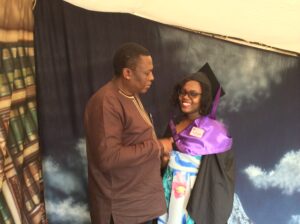
We want to mobilize more partners to support Light Every Birth and We Care Solar. Together, we will light the way!


